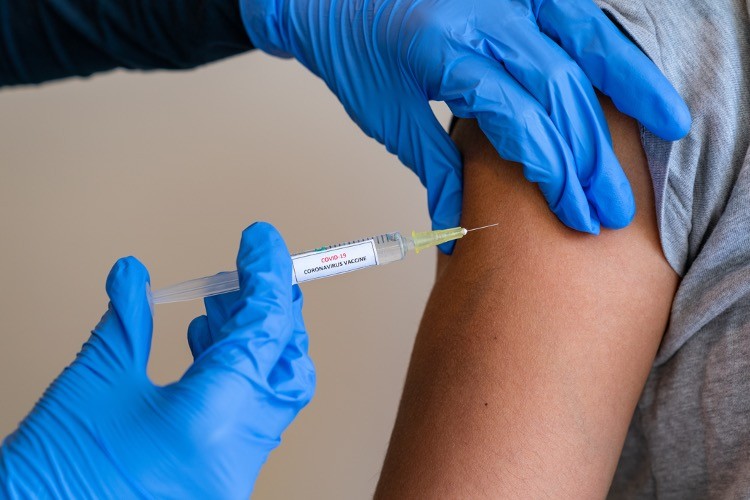OSHA Looking to Expand Vax Mandate to Small Businesses as Biden Admin Gets Sued
by Veronika Kyrylenko
 Chaz Bharj/iStock/Getty Images Plus
Chaz Bharj/iStock/Getty Images PlusThe Biden administration is so eager to reach a 98-percent COVID vaccination rate it devotes all of its creativity to finding new ways to get the stubborn “anti-vax” Americans jabbed. On Thursday, the Biden administration indicated its vaccination mandate for larger businesses might soon be expanded to companies with fewer than 100 employees. The decision on that will be made after “collecting public comment” on that proposal for the next 30 days.
On Thursday, the Labor Department’s Occupational Safety and Health Administration (OSHA) issued an emergency temporary standard (ETS) that requires all private businesses with 100 or more employees to have their workforce vaccinated against COVID by January 4, 2022 or have them undergo weekly testing. OSHA will fine the companies up to $13,653 per violation, or $136,532 for a willful violation.
But why stop with large employers and give the smaller ones a pass? Don’t workers at mom-and-pop stores face a “grave danger” of COVID, to use OSHA’s jargon?
In the 490-page document entitled “COVID-19 Vaccination and Testing; Emergency Temporary Standard” published in the Federal Register on Thursday, OSHA wrote that it was prioritizing the mandate for the larger companies firsts, and expressed its confidence they “will have sufficient administrative systems in place to comply quickly with the ETS.”
The document’s “Request for Comment” section reads,
The agency is moving in a stepwise fashion on the short timeline necessitated by the danger presented by COVID-19 while soliciting stakeholder comment and additional information to determine whether to adjust the scope of the ETS to address smaller employers in the future.
Which information, specifically, OSHA would like to receive for considering expansion of the mandate? The agency wants to know:
about the ability of employers with fewer than 100 employees to implement COVID-19 vaccination and/or testing programs. Have you instituted vaccination mandates (with or without alternatives), or requirements for regular COVID-19 testing or face covering use? What have been the benefits of your approach? What challenges have you had or could you foresee in implementing such programs? Is there anything specific to your industry, or the size of your business, that poses particular obstacles in implementing the requirements in this standard? How much time would it take, what types of costs would you incur, and how much would it cost for you to implement such requirements?
But does the administration really care about the interests of the private employers or is this “questionnaire” designed to make an impression that the government would actually listen to the private sector when expanding a rule that puts people in the position of choosing between their bodily autonomy and employment?
When President Joe Biden announced his six-prong plan on September 9 to increase Americans’ vaccination rate, which included tasking OSHA with drafting the ETS for larger companies, such companies were not at all excited about the mandates.
Fortune reported back then that according to national polls, only about seven percent of private businesses said they would fire an employee who refused to get a COVID shot. Only about 22 percent of businesses planned to require a shot for their on-site employees. The polls also showed the companies, trying to balance between the “safety from COVID” and business efficacy, were heavily relying on alternatives to a vaccine mandate, such as remote work options, periodic testing, and basic safety protocols, such as social distancing.
Still, the administration moved forward with its draconian plans.
Already, the new rule has been met with strong opposition from Republicans and some businesses.
On Friday, attorneys general in 11 states filed a lawsuit against the Biden administration, challenging the OSHA requirement. “This mandate is unconstitutional, unlawful, and unwise,” said the court filing by Missouri Attorney General Eric Schmitt.
More states are expected to follow suit, since in September, nearly every GOP state attorney general announced their intent to sue the administration if the mandate is implemented, calling it “illegal,” “disastrous and counterproductive.” They argued that OSHA had no business regulating dangers “existing in the world generally,” such as COVID, but only those specific to the workplace.
“This rule is garbage,” South Carolina Attorney General Alan Wilson, a Republican, said Thursday. “It’s unconstitutional and we will fight it.” His state’s governor, Republican Henry McMaster, announced he is planning to issue an executive order keeping state agencies from enforcing the rule, according to U.S. News.
The Daily Wire filed a lawsuit against the OSHA rule in federal court on Thursday. So did two Wisconsin manufacturers, along companies in Michigan and Ohio, arguing they are already facing staffing shortages that would worsen if the mandate is implemented.
The Biden administration defended its “right” to force employers to ask their workers to get a jab or lose a job and rejected the assumption that the mandate hurts businesses. President himself claimed, “There have been no ‘mass firings’ and worker shortages because of vaccination requirements,” while adding the mandate enjoys “broad public support.”
Secretary Marty Walsh said Thursday that the federal government has “every right” to mandate a shot to private businesses to “help with workplace safety.”
The administration’s various vaccine rules cover some 100 million employees, or about two-thirds of the American workforce, according to Reuters. Now, despite all the pushback and opposition, the administration is looking to force the remaining one third of employed Americans to get a jab “or else.” www.fotavgeia.blogspot.com

Δεν υπάρχουν σχόλια:
Δημοσίευση σχολίου